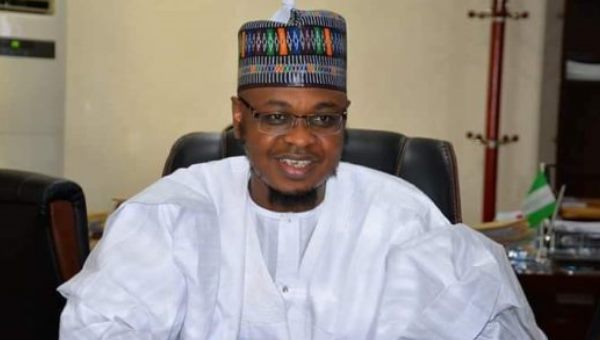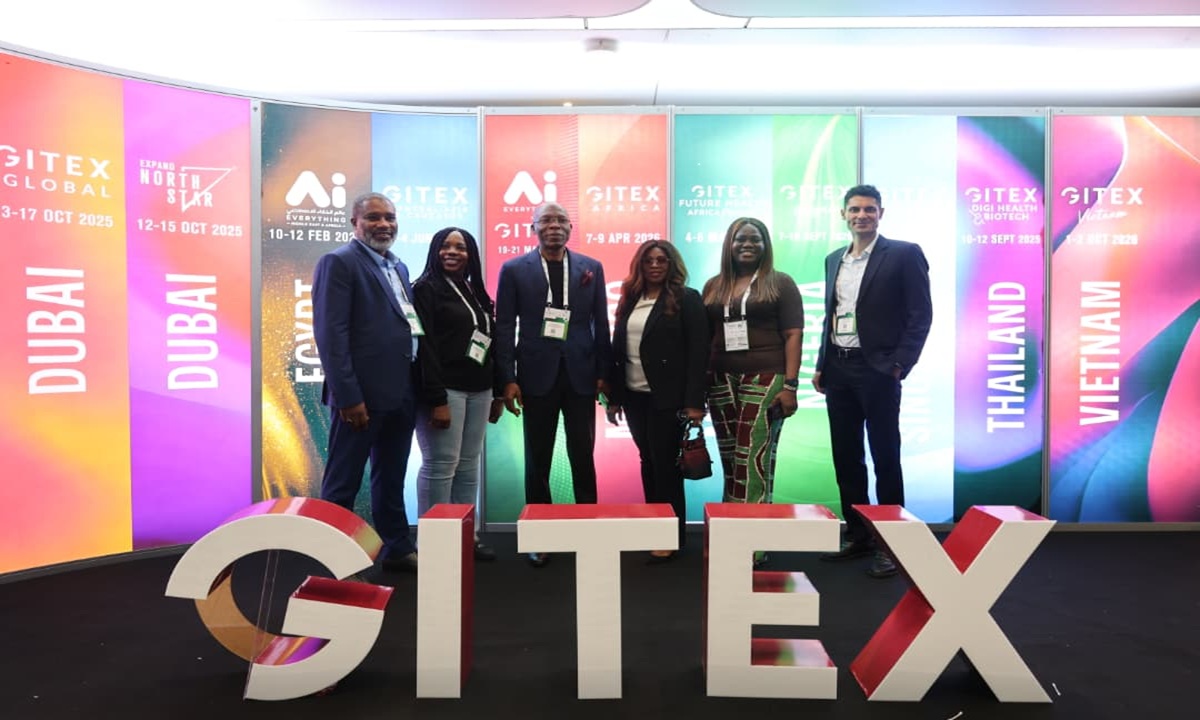E-Business
Local Content Development: FG Drums Support for Arravo

Dr. Isa Ibrahim Pantami, minister of Communications and Digital Economy, has said the federal government will continue to support Arravo, a technology solution provider, on its local content development drive, which he added, would enhance digital transformation across the country.

Dr. Isa Ibrahim Pantami
Pantami who gave the commitment during the recent launch of Arravo’s new brand identity in Lagos, said the switch from BCX Nigeria, which hitherto had foreign stakeholders, to Arravo, which is a complete ownership by Nigerians, would enable the new owners to grow the company, using full local content that will benefit Nigerians.
According to the Minister, “FG is determined to advance our indigenous content in ICT within Nigeria, particular as it relates to our national digital economy policy for our digital Nigeria. Any effort that will promote digital economy and indigenous content in ICT, will be welcomed by government. Digital economy is currently dominating the world economy.
According to Oxford Economist, four years ago, digital economy was valued at $11.5 trillion and at that time, it was up to 15.5 per cent of the entire world economy.
Digital Economy in United States of America, in 2017, created up to 5.1 million jobs.
“The COVID-19 pandemic which ravaged global economy, compelled nations to adopt and deploy digital technology, which is a clear sign that Nigeria among other nations, must also embrace digital technology to promote our indigenous content.”
Our digital economy journey started October 24, 2019, when President Mohammadu Buhari consented to our request to upgrade the Nigerian ministry from Federal Ministry of Communications to Federal Ministry of Communications and Digital Economy”, Pantami said.
He added, “From that time, we were mandated to develop national digital economy policy for our digital Nigeria, which we have already done and it was launched by President Buhari on November 28, 2019 in Abuja.
Since the launch, we have been working hard to provide the enabling environment on which digital economy will thrive in the country.
“We came up with eight pillars, which include: developmental regulation, digital skills, solid infrastructure, service infrastructure, digital services, software infrastructure, digital society and emerging technologies, and indigenous content development and promotion.
“Arravo’s vision for local content development is in line with the 8th pillar of government to promote indigenous content, and government will support Arravo to achieve this. We encourage all stakeholders to promote local content and produce what we need, while government will ensure that we consume what we produce locally,” Pantami said.
Mr. Ayo Adegboye, managing director/CEO of Arravo, said the parent company from South Africa decided to diverse their stake outside Africa and a few of us came together as investors to acquire the stake from BCX South Africa and BCX Nigeria. The bold step we took to acquire the multi-million dollar stake, has actually brought us to where we are today, with Arravo as the new brand identity.
“With the rebranding, we are on our way to becoming the industry giant and we are not going to achieve this all alone. We will be collaborating with industry players to achieve our goal of becoming the industry giant.
Our emphasis will be on embracing partnerships and we will try not just to be excellent, but to be exceptional, in order to engage, disrupt and deliver the best of technology solutions for business resilience,” Adegboye said.
Original Equipment Manufacturers present at the rebranding event, equally restated their commitments to continue partnering Arravo, even with its new brand identity.
E-Business
Nigerian Students Embrace AI as a Study Partner – Google

As students across Nigeria head back to school, new data from Google Search trends reveals a significant shift in study habits, with a massive turn towards Artificial Intelligence (AI) for academic support. Search interest for “AI + studying” surged by over 200% compared to 2024, highlighting how students are increasingly leveraging AI tools as a primary resource for learning.

This trend is part of a broader surge in AI curiosity in Nigeria. Search interest in AI reached an all-time high in 2025, growing by 60% over the past 12 months. Nigerians are not just asking what AI is, but how to use it to enhance their daily lives, particularly in education. The data shows a 60% increase in searches for “AI + lessons” over the past year.
AI Integration Across Academic Disciplines
Students are applying AI to a wide range of subjects. Over the last year, searches combining AI with specific school subjects have seen remarkable growth:
AI + Chemistry: increased by 50%
AI + Maths: increased by 30%
AI + Languages: increased by 30%
AI + Grammar: increased by 20%
The nature of these searches indicates that students are seeking practical help. Top searched questions for mathematics include, “what is the best AI in the world for solving mathematical problems” and “how to use AI to solve math problems.” Similarly, top searches for studying in general include queries for “AI tutor for students,” “free AI tools for studying,” and “useful AI prompts for studying,” showing a clear demand for accessible and specialized AI-powered educational tools.
Beyond the Classroom: Understanding AI and Preparing for the Future
The interest in AI extends beyond homework and exam preparation. There is a growing curiosity about the technology itself, with trending questions like “how to use ai” (+80%), “what is the full meaning of AI” (+80%), and “who is the father of ai” (+70%) all rising in the past year.
Significantly, as students use AI for their work, they are also becoming more aware of the ecosystem around it. Searches for “AI detection” have seen a massive 290% increase in the past 12 months, suggesting a growing conversation around academic integrity and the responsible use of AI tools.
Looking towards future careers, “Generative AI” was a breakout search term over the past 12 months, often appearing alongside searches for “professional certification.” This indicates that students and young professionals are not only using AI to succeed in their current studies but are also actively looking to build skills that will prepare them for the future workforce.
Olumide Balogun, West Africa Director at Google, said: “It’s inspiring to see Nigerian students so eagerly embrace AI to support their learning journeys. This back-to-school season, the data shows that students are not just using AI for answers, but as a tool to deepen their understanding of complex subjects, from chemistry to mathematics. This curiosity is key to fostering a new generation of innovators, and we are committed to providing tools that empower them to learn, grow, and succeed.”
E-Business
TD Africa and IBM Ignite Africa’s Tech Future @GITEX Nigeria 2025

TD Africa, Africa’s leading technology distributor, proudly participated in the just-concluded GITEX Nigeria 2025, held for the first time in the country from September 1st to 4th.

TD Africa
The exhibition, hosted at the Eko Hotel Convention Centre, brought together global tech leaders, professionals, and exhibitors showcasing innovations in AI, IoT, cybersecurity, fintech, and more.
In collaboration with IBM operated by MIBB, TD Africa demonstrated its commitment to empowering individuals and businesses across Africa through technology and innovation. Their joint presence at the exhibition drew significant attention from industry leaders, policymakers, and innovators alike.
One of the defining moments was the visit of the Governor of Lagos State, His Excellency Babajide Sanwo-Olu, to the TD Africa–IBM booth. Governor Sanwo-Olu was warmly received by Mrs. Chioma Ekeh, CEO of TD Africa, who highlighted the company’s impact and vision.
The Governor applauded TD Africa’s innovation, tenacity, and longevity in Africa’s technology ecosystem.
In her remarks, Mrs. Ekeh expressed gratitude for the Governor’s support and reiterated TD Africa’s unwavering commitment to advancing digital transformation across the continent: “It’s not a coincidence for GITEX to have taken place in Nigeria, as the world is becoming aware that this is where the energy of Africa collides with the ambition of the future.
“As long as TD Africa stands strong behind global brands like IBM and others we represent, we can only go further, stronger, and better.”
Also visiting the booth was the Minister of Communications, Innovation and Digital Economy, Dr. Bosun Tijani, who emphasised the importance of collaboration in shaping Africa’s digital future.
Adding to the momentum, Mr. Vishnu Taimni, General Manager of IBM operated by MIBB, stressed the need for sustained innovation and partnership: “Africa’s digital journey cannot be achieved in isolation.
“Our collaboration with TD Africa at GITEX is proof that when global expertise meets local strength, we unlock the future of technology for businesses, governments, and communities across the continent.”
The booth was further honoured by the presence of Dr. Leo Stan Ekeh, Chairman of Zinox Group, who commended TD Africa and IBM for their steadfastness and consistency in driving growth and innovation in Africa’s technology sector.
The successful participation of TD Africa at GITEX Nigeria 2025, in partnership with IBM, reinforces its position as a pillar of Africa’s digital transformation journey.
By standing strong with global partners and local stakeholders, TD Africa continues to shape the future of technology in Africa, driven by resilience, innovation, and impact.
E-Business
Report Shows Attacks on Smartphones Increased in the First Half of 2025

According to Kaspersky data, there were 29% more attacks on Android smartphone users in the first half of 2025 compared to the first half of 2024, and 48% more compared to the second half of 2024.

In 2025, Kaspersky detected prominent mobile threats such as SparkCat, SparkKitty and Triada, but there were other active threats as well, including apps with adult content that could launch DDoS attacks and a VPN app that intercepted login codes sent through text messages.
In the second quarter of 2025, attackers embedded functionality for dynamically configured DDoS attacks into applications for viewing adult content. This trojan enables sending specific data from the infected device to the attackers at specified time intervals.
Kaspersky also recently detected a fake VPN client that hijacks different user accounts: instead of providing the declared functionality, it intercepts one-time password codes from various messengers and social networks by monitoring notifications and sends them to the attackers via a Telegram bot.
The most popular malicious apps
Malicious apps that mobile users most frequently encountered were Fakemoney scam applications, banking trojans and preinstalled malware.
Fakemoney scam apps on smartphones are fraudulent applications that deceive users into believing they can earn real money or rewards through tasks, games or investments, but then steal personal information, money or deliver no actual payouts.
Pre-installed trojans like Triada and Dwphon were also frequently detected. These are examples of malicious software embedded in the firmware of Android devices during manufacturing, enabling data theft, unauthorised actions and persistence even after factory resets.
Mobile banking trojans
The number of mobile banking trojans detected in the first half of 2025 is almost four times more than in the first half of 2024 and over two times more than in the second half of 2024.
“The first half of 2025 saw a surge in Android malware attacks compared to 2024. There are different attack vectors, and sideloading apps from outside app stores is one of them. Google’s recent initiative to verify developers even for sideloaded apps is an attempt to counter malware spread via APK files outside official app stores.
“However, this step is not a silver bullet. Malware continues to infiltrate even the Google Play Store, where developer verification has long been in effect. Malware infiltrates Apple’s AppStore as well. Attackers will likely find ways to bypass verification, that underscores the need for users to combine robust security solutions, cautious app sourcing and regular OS updates to stay ahead of evolving threats,” comments Anton Kivva, Malware Analyst Team Lead at Kaspersky.

 Telecom3 days ago
Telecom3 days agoMTN to Shut Down 2G, 3G Services in Ghana

 News3 days ago
News3 days agoZinox, KongaCares Launch 1m Laptop Drive to Transform Nigerian Schools

 E-Business3 days ago
E-Business3 days agoFirm Warns of a New Credential-stealing Campaign via Facebook

 E-Financial3 days ago
E-Financial3 days agoNOA Urges Nigerians to Reclaim N190Bn Unclaimed Dividends

 News3 days ago
News3 days agoTUC Labels 5 Percent Tax on Petroleum Products ‘Economic Wickedness’, Threatens Strike

 E-Financial3 days ago
E-Financial3 days agoPalmPay Champions Trust, Local Partnerships at GITEX Nigeria 2025

 General News3 days ago
General News3 days agoAfrinvest Marks 30 Years, to Unveil 20th Banking Sector Report

 General News3 days ago
General News3 days agoKeyamo Orders NCAA to Name, Shame Airlines over Breach of Aviation Rules


























